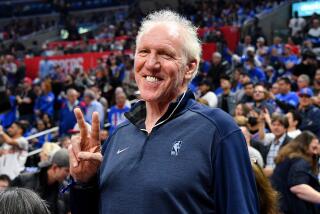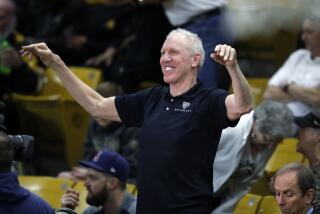Greg Patton’s Great Passion Is Work : Tennis: From UC Santa Barbara, the Peace Corps, UC Irvine and now the Newport Beach Dukes, he brings a winning charisma to the game.
- Share via
IRVINE — Greg Patton’s r.p.m. are slowing as he reclines on a white couch in the living room of his University Hills condo. It’s late evening and finally it’s possible for a visitor to keep up with the conversation.
For almost three hours, it’s been a desperate race to capture the hyperbolic passion that swells from Patton. It’s never been easy, but it’s never dull, either.
Christa Patton, his wife, brings coffee from the kitchen, and it’s not long before he’s off and running again. Maybe it’s the caffeine, or simply a second wind, but soon he’s broken into a full sprint. Where he’s headed no one knows.
“The thing you can say about my career is that it’s a fantasy come true,” he says. “It’s exactly like being in a movie. It’s the cherry on top of the sundae. It’s not like punching the time clock. It’s a never-ending storybook. You think you’ve got it made and the next day you’re struggling. You’re struggling and the next day you’ve got it made.”
For 12 hyperactive years, Patton has energized the UC Irvine men’s tennis team, ripped it out of its humble NCAA Division II roots and thrown it into national prominence at the Division I level.
It’s been difficult to tell whether he startled people more by coaching UCI to five NCAA tournament appearances and nine Big West Conference championships or by describing it all in his peculiar way.
That winning charisma was just what Newport Beach Dukes promoter Fred Lieberman hoped to find as he searched for a coach for his new TeamTennis franchise last year.
And it’s just what the United States will get when Patton coaches the national team in the Pan American Games next month in Cuba.
Can you imagine it? Patton meeting Castro right there in Havana.
“I’d love it,” Patton says.
Christa just laughs.
A 38-year-old graduate of UC Santa Barbara, the Peace Corps, the cracked Santa Barbara city tennis courts and his own school of hard knocks, Patton shows no signs of slowing down.
He’s supposed to be on vacation, but since school ended last month, he’s worked at UCI’s tennis camp daily except for the three days he spent at a high school tennis coaches’ clinic in North Dakota.
This week, he’s been preparing for the Dukes’ season, which begins with a match against the San Antonio Racquets tonight at the John Wayne Tennis Club in Newport Beach. And he’s awaiting the start of the Pan-Am Games next month.
He is happy to be swamped with work. Thrilled to be coaching at UCI; to be married to Christa; to
mug with baby daughter Chelsea; to entertain and cajole and browbeat the players he coaches day after day.
“I’m doing what I want to do,” he says. “Except for being a stand-up comedian, and tennis lets me do that.”
It’s a wonderful life if you’re Greg Patton.
“I was a Santa Barbara homeboy,” Patton says as he watches the sunset from his hilltop back yard. “It was like a small town then. I loved the sense of community. I grew up on the mesa overlooking Santa Barbara City College. There was no traffic. It was ideal. If I were reincarnated, I’d want to be myself again.”
Patton grew up consumed by two things--sports and family. As a youngster, he played baseball, basketball, football and went surfing, sometimes all in the same day. The neighborhood was filled with boys his age who loved to play games as much as he did.
His father, Phil, was sports editor at the Santa Barbara News-Press and read the sports section to Greg every morning. His mother, Rita, raised seven children and gave Greg his first tennis lessons.
One day when he was 12, Patton’s dream world was changed forever by a single shot from a BB gun.
While playing below a bridge, Patton looked up to see a youngster standing on the overpass aiming a BB gun at him. The child fired, blinding Patton in the right eye.
Suddenly, so many doors open to Patton were slammed shut. For a year, he was restricted by doctors from any physical activity that might further injure his eye.
When the year passed, Patton tired quickly of games that had been so much fun.
“My whole goal became just to hit the backboard,” Patton says. “And I loved to shoot baskets. I thought I was going to be like Dr. J--Julius Erving. I was going to be Dr. G.”
As much as it pained him, it was difficult for Patton to cry to his parents about missed baskets when he only had to look at his sister, Therese, to see an important struggle. Everyday life was a difficult battle for Therese, who is mentally retarded. She now lives at the Camarillo State Hospital.
Even as Greg wrestled with his hazy vision, it was clear things would get better for him; they would not for Therese.
One day, Rita Patton took Greg to the nearby tennis courts and began hitting balls at him. Some he returned badly, some he missed, but others sailed back with some zip on them. In time, Patton embraced the game, even as he fumbled to master the simplest tasks.
Later, he became a standout at Bishop Diego High School, then at UCSB, where he earned a scholarship.
When Patton was 17, his father died of cancer at 41, forcing Greg into adulthood faster than he might have wanted. Money was tight for a while, and Greg’s athletic scholarship was a Godsend.
After graduating from UCSB, Patton joined the Peace Corps and went to Ghana on Africa’s west coast to teach tennis, but dysentery drove him home earlier than expected.
Then 22, he weighed his options and decided to accept a job coaching the UCSB men’s team. Patton, who had once run for city council (and lost), gone to Africa, and coached homemakers in a recreation department class all because he wanted to have an affect on people’s lives, suddenly found his niche. At the time, it meant he had to live out of his van because the $4,000 stipend wasn’t enough to make ends meet, but he didn’t mind.
“Coaching showed me who I am,” he says. “I think I found myself . . . right next to a ball machine and a pilfered Albertson’s shopping cart with 600 tennis balls in it.”
Patton spent two seasons at UCSB, one at Cal State Bakersfield, then came to UCI in 1980, intent on building a Division I powerhouse.
“I went from living in my van to living in my office,” Patton says. “I was obsessed with building a program.”
Sometimes it rubbed opponents the wrong way.
“He used to drive me crazy,” says Brad Stine, a former player at Fresno State and now the Bulldogs’ coach. “I always thought you needed wading boots and a shovel around him. But later I realized it was really him. You could take the waders off. He was so emotional, so intense, you think it’s a put-on. But it’s not. As I got to know him, I saw how genuine and honest he is.
“He’s bald, ugly and has a big gap between his front teeth. We’re very close. He was the best man in my wedding.”
Later, after they became friends, Patton and Stine were named to coach the U.S. Junior Davis Cup teams in 1984 and ’87. Michael Chang (1989 French Open champion), Jim Courier (1991 French champion), Pete Sampras (1990 U.S. Open champion) and David Wheaton (1991 Wimbledon semifinalist) played on the ’87 team.
Also that year, Patton was named national collegiate coach of the year, a sure sign he had joined the coaching elite.
In 1990, UCI won its fourth consecutive conference championship, edging Fresno State by the barest of margins. Earlier in the day, playing on the same court that UCI would clinch the title, Steve Aniston won the men’s open singles championship.
If possible, Patton seemed happier with Aniston’s victory that day than with the Anteaters’ victory.
If Aniston was the most talented player Patton ever coached, it’s also possible that Aniston was the most troubled. In 1985, Patton dismissed Aniston, who had been arrested for possession of cocaine while at Irvine, from the team.
After a stay in drug rehabilitation, Aniston turned professional, played at Wimbledon and at other, lesser-known tournaments. At Ojai on that sun-splashed April day, it looked as if Aniston had turned his life around.
If he had, however, it didn’t last long. On Sept. 21, 1990, Aniston was found stabbed to death in his silver Mitsubishi on Yorktown Avenue in Huntington Beach. A drug dealer was later convicted of murdering Aniston in a dispute over a $20 package of cocaine.
“He was a tortured artist,” Patton says. “The book was never finished. There’s still a chapter missing. There was such disappointment, such loss. I felt he had such a charisma to change people.”
Hard as Aniston’s death has been to accept, losing has always been part of the equation and Patton knows this well. So much has happened in his life, but Patton wouldn’t change any of it because he has gained so much.
He lost his sight in one eye, and discovered tennis. He watched his mentally retarded sister and felt compassion. He lost his father, and developed leadership and responsibility. He became ill in Africa, returned to Santa Barbara and found direction. He watched Aniston’s life slip away to drug addiction, and renewed his faith in fighting hard against no-win situations just on the chance that something good would happen.
“I’ve always tried to solve the problems I’ve had,” Patton says. “I have to look at what I am. I’m very passionate. Life is too short.”
More to Read
Go beyond the scoreboard
Get the latest on L.A.'s teams in the daily Sports Report newsletter.
You may occasionally receive promotional content from the Los Angeles Times.










